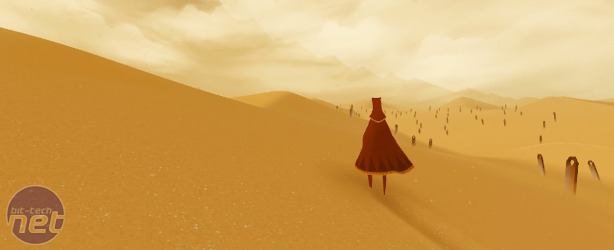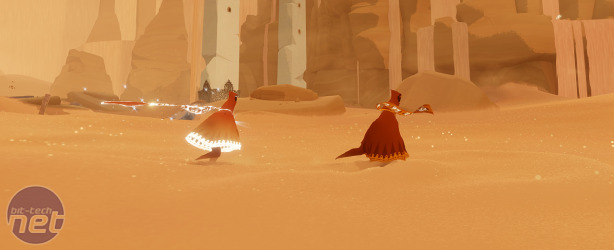
Robin Hunicke Interview
BG: Is that something that you anticipated and included into the design?RH: Absolutely. Now will be an interesting time to play Journey but in three years it will still be interesting because it’ll be really miraculous if you find someone else.
BG: You’re not worried maybe some people will find that desolate and abandoned feeling a little unnerving? Or maybe off-putting?
RH: Well, Journey is not all desolate. And it’s not all desert. There are other things to see and do there but it will definitely be interesting to see.
BG: It reminds me a little of Shadow of the Colossus, but without the colossi.
RH: Yeah, we were talking about that before. I couldn’t finish Shadow of the Colossus because I couldn’t kill them. I felt too bad. I still can’t watch people kill them, it makes me really sad. It kills me to see it. I just can’t watch it – they’re so beautiful to me. I think that was another unique experience. People were asking themselves, ‘why am I doing this? What’s the point?’ It's important for people to ask that.
BG: Would you say then that Journey is a kind of ‘existential’ game? Is that something you thought about?
RH: It’s certainly philosophical. And its underpinnings – we thought a lot about what it would mean to have certain things happen in the world and how events should be interpreted or if things should be left open so that there’s a lot of room for interpretation and meditation on the experience itself. Absolutely, one hundred percent, we think about that stuff all the time. We have heated discussions about it!
BG: It’s very deliberately a two-player (or single-player) experience. But when you were first designing it did you ever toy with the idea of throwing a third person into the game? Or more?
RH: I’ll actually cover this in my talk later [for GameCity] but yeah... The first prototype for Journey was a four player prototype. And then we whittled it down to two players for a variety of reasons. There were definitely things we figured out along the way. One of the reasons that I think it’s so important to do exploratory game design and experimental work is that we can share these things with the community and build on them.
Even just the idea of the way that we’ve built the multiplayer has already influenced a couple of other games – people in our community who have told us what they’re working on. Concepts that are similar now because it reduces the need to feel anxiety. There’s no lobby, there’s no signing up, you don’t have to arrange [things] with your friend – you just go into the world and then you see people. Just like when you go on a hike. That kind of innovation is the kind of thing that I think is so important to games.
BG: If an even bigger developer took some of the ideas from Journey and applied that to, say, a first-person shooter or whatever – that’s just an example – would that be good for you guys, because it’d be bringing innovation to other mainstream genres?
RH: Anytime somebody is influenced by TGC in a positive way we consider that positive, you know. Our goal as a company is to create new experiences and to show that these kinds of experiences can exist in the commercial landscape – that they can be viable, sellable, profitable and impactful. We care about making an impact but we don’t do what we do in order to satisfy those goals.
The number one goal for us always is create a new experience for the player. That is the most important thing. That’s our guiding light. So it’s nice if people can learn from that something they can take forward to their players because that means they’re making their players happier, they’re making their players feel something new, something different. That’s awesome.

MSI MPG Velox 100R Chassis Review
October 14 2021 | 15:04











Want to comment? Please log in.